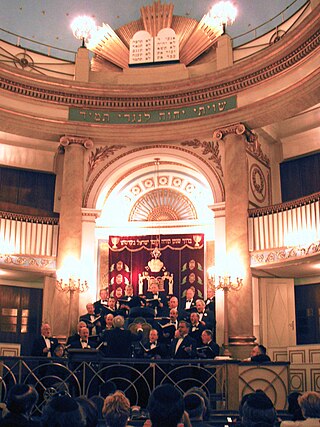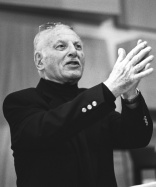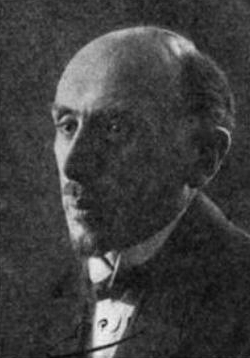
A hazzan or chazzan is a Jewish musician or precentor trained in the vocal arts who leads the congregation in songful prayer. In English, this prayer leader is often referred to as a cantor, a term also used in Christianity.

Gershon-Yitskhok Leibovich Sirota was one of the leading cantors of Europe during the "Golden Age of Hazzanut", sometimes referred to as the "Jewish Caruso".
Samuel Hans Adler is an American composer, conductor, author, and professor. During the course of a professional career which ranges over six decades he has served as a faculty member at both the University of Rochester's Eastman School of Music and the Juilliard School. In addition, he is credited with founding and conducting the Seventh Army Symphony Orchestra which participated in the cultural diplomacy initiatives of the United States in Germany and throughout Europe in the aftermath of World War II. Adler's musical catalogue includes over 400 published compositions. He has been honored with several awards including Germany's Order of Merit – Officer's Cross.

Louis Lewandowski was a Polish-Jewish and German-Jewish composer of synagogal music.
Abraham Wolf Binder was an American composer.
Simon Arthur Sargon was a composer, pianist, conductor, music educator, and major creative figure in contemporary American Jewish music. His compositions include liturgical and secular pieces; opera and musical theatre; works for youth ensemble; choral and art song; and chamber ensemble and symphonic works.
The Jewish art music movement began at the end of the 19th century in Russia, with a group of Russian Jewish classical composers dedicated to preserving Jewish folk music and creating a new, characteristically Jewish genre of classical music. The music it produced used Western classical elements, featuring the rich chromatic harmonies of Russian late Romantic music, but with melodic, rhythmic and textual content taken from traditional Jewish folk or liturgical music. The group founded the St. Petersburg Society for Jewish Folk Music, a movement that spread to Moscow, Poland, Austria, and later Palestine and the United States. Although the original society existed formally for only 10 years, its impact on the course of Jewish music was profound. The society, and the art music movement it fostered, inspired a new interest in the music of Eastern European Jewry throughout Europe and America. It laid the foundations for the Jewish music and Klezmer revival in the United States, and was a key influence in the development of Israeli folk and classical music.
Louis Harry Danto was a lyric tenor and cantor. He was acclaimed for his cantorial music, concert appearances and recordings of Italian, Russian, and French opera repertoire. Danto performed throughout North America, Europe and Israel, and recorded 24 solo albums.

Leib Glantz was a lyrical tenor cantor (chazzan), composer, musicologist of Jewish music, writer, educator, and Zionist leader.
The modern Reform Cantorate is seen as a result of developments that took place during the 19th century, largely in Europe. The process continued to evolve in America following the emigration of German Reform Jews towards the end of the century.

Herman Berlinski was a German-born American composer, organist, pianist, musicologist and choir conductor.
Hugo Chaim Adler, was a Belgian cantor, composer, and choir conductor. He is primarily recognized for creating and popularizing contemporary versions of 19th-century Jewish cantorial music. He is the father of Samuel Adler, a prominent American composer of contemporary classical music.

Herman Wohl was a Jewish–American composer closely associated with the American Yiddish Theatre.

David Roitman was a Russian-American hazzan and composer. Early in his career he worked as cantor in villages and cities in Russia such as Vilna and Odessa. In 1921 he immigrated to the United States and eventually joined the Congregation Shaare Zedek. Renowned for his lyric tenor compositional recordings and cantorial recitatives, Roitman became known as "the poet of the pulpit".
Gerald Cohen is an American composer and cantor. He is currently the cantor at Shaarei Tikvah in Scarsdale, New York and is based in Yonkers. Cohen serves on the faculties of Jewish Theological Seminary and Hebrew Union College. Cohen's compositions are published by Oxford University Press, G. Schirmer/AMP, and Transcontinental Music Publications.

Jacob Weinberg was a Russian-born American Jewish composer and pianist who composed over 135 works for piano and other instruments. He was one of the founders of the Jewish National Conservatory in Jerusalem before immigrating to the U.S. where he became "an influential voice in the promotion of American Jewish music" from the 1940s until his death.

The Brodsky Synagogue is a Reform Jewish synagogue, located at Zhukovskoho Street 18, in Odesa, Ukraine.

Joseph Brody was an American Jewish composer who wrote for the Yiddish theatre as well as liturgical Jewish works. He taught George Gershwin and was a friend of Yossele Rosenblatt. His daughter, Estelle Brody, was an actress.

The history of the Jews in Odesa dates to 16th century. Since the modern city's founding in 1795, Odesa has been home to one of the largest population of Jews in what is today Ukraine. Odesa was a major center of Eastern European Jewish cultural life. From Odesa sailed the SS Ruslan which is considered the mayflower of Israeli culture. They comprised the largest ethno-religious group in the region throughout most of the 19th century and until the mid-20th century when the Jews were massacred by Romanian forces occupying the city or deported to be later killed during the Holocaust.
Samuel Weltsch was a Bohemian ḥazzan and composer.











